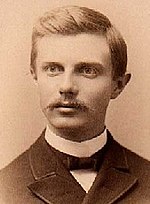Frontier Thesis
The Frontier Thesis or Turner Thesis is the conclusion of Frederick Jackson Turner that the wellsprings of American character and vitality have always been the American frontier, the region between civilized society and the untamed wilderness. In the thesis, the frontier created freedom, "breaking the bonds of custom, offering new experiences, [and] calling out new institutions and activities." Turner first announced his thesis in a paper entitled "The Significance of the Frontier in American History," delivered to the American Historical Association in 1893 at the World Columbian Exposition in Chicago. The thesis dominated much of scholarship until the 1960s. It was then challenged by the "New Western Historians," who ignored its valid conclusions but instead charged that it ignored ethnic minorities and women and was too praiseworthy of the pioneers.
Turner set up an evolutionary model (he had studied evolution with a leading geologist), using the time dimension of American history, and the geographical space of the land that became the United States. His argument was that the new environment had caused a rapid evolution of social and political characteristics, thereby creating the true "American." The first settlers who arrived on the east coast in the 17th century acted and thought like Europeans. They encountered a new environmental challenge that was quite different from what they had known. The most important difference was vast amounts of unused high quality farmland (some of which was used by a few thousand Indians for hunting grounds.) They adapted to the new environment in certain ways — the sum of all the adaptations over the years would make them Americans. The next generation moved further inland. It discarded more European aspects that were no longer useful, for example established churches, established aristocracies, intrusive government, and control of the best land by a small gentry class. Every generation moved further west and became more American, and the settlers became more democratic and less tolerant of hierarchy. They became more violent, more individualistic, more distrustful of authority, less artistic, less scientific, and more dependent on ad-hoc organizations they formed themselves. In broad terms, the further west, the more American the community.
Turner's thesis quickly became popular among intellectuals, as well as spokesmen for the west. It explained why the American people and American government were so different from Europeans. It sounded an alarming note about the future, since the U.S. Census of 1890 had officially stated that the American frontier line (separating the more-settled and lighty settled zones) had broken up. The idea that the source of America's power and uniqueness was gone was a distressing concept for some intellectuals. Some talked about overseas expansion as a new frontier; others (like John F. Kennedy) called for a "new frontier" of achievement. Despite criticism, Turner's theory entered its second century "in remarkably good shape."[1]
Bibliography
- The Frontier In American History by Frederick Jackson Turner
- Ray Allen Billington. The American Frontier (1958) 35 page essay on the historiography
- Billington, Ray Allen. Frederick Jackson Turner: historian, scholar, teacher. (1973), highly detailed scholarly biography.
- Billington, Ray Allen, ed,. The Frontier Thesis: Valid Interpretation of American History? (1966); the major attacks and defenses of Turner.
- Billington, Ray Allen. America's Frontier Heritage (1984), an analysis of Turner's theories in relation to social sciences and historiography
- Billington, Ray Allen. Land of Savagery / Land of Promise: The European Image of the American Frontier in the Nineteenth Century (1981)
- Bogue, Allan G. . Frederick Jackson Turner: Strange Roads Going Down. (1988), highly detailed scholarly biography.
- Etulain, Richard W. Does the Frontier Experience Make America Exceptional? (1999)
- Etulain, Richard W. Writing Western History: Essays on Major Western Historians (2002)
- Etulain, Richard W. and Gerald D. Nash, eds. Researching Western History: Topics in the Twentieth Century (1997)
- Faragher, John Mack ed. Rereading Frederick Jackson Turner: "The Significance of the Frontier in American History". (1999)
- Hine, Robert V. and John Mack Faragher. The American West: A New Interpretive History (2000), deals with events, not historiography
- Hofstadter, Richard. The Progressive Historians--Turner, Beard, Parrington. (1979). interpretation of the historiography
- Jensen, Richard. "On Modernizing Frederick Jackson Turner," Western Historical Quarterly 11 (1980), 307-20. in JSTOR
- Lamar, Howard R. ed. The New Encyclopedia of the American West (1998), 1000+ pages of articles by scholars
- Limerick, Patricia Nelson. "Turnerians All: The Dream of a Helpful History in an Intelligible World," The American Historical Review, Vol. 100, No. 3 (Jun., 1995), pp. 697-716 online at JSTOR
- Milner, Clyde A., II ed. Major Problems in the History of the American West 2nd ed (1997), primary sources and essays by scholars
- Nichols, Roger L. ed. American Frontier and Western Issues: An Historiographical Review (1986) essays by 14 scholars
- Paxson, Frederic, History of the American Frontier, 1763-1893 (1924), textbook
- Slotkin, Richard. Regeneration through Violence: The Mythology of the American Frontier, 1600-1800 (1973), complex literary reinterpretation of the frontier myth from its origins in Europe to Daniel Boone
- White, Richard, and Patricia Nelson Limerick. The Frontier in American Culture (1995), critique by advocated of the "New Western History"
- ↑ Limerick (1995) p 697
